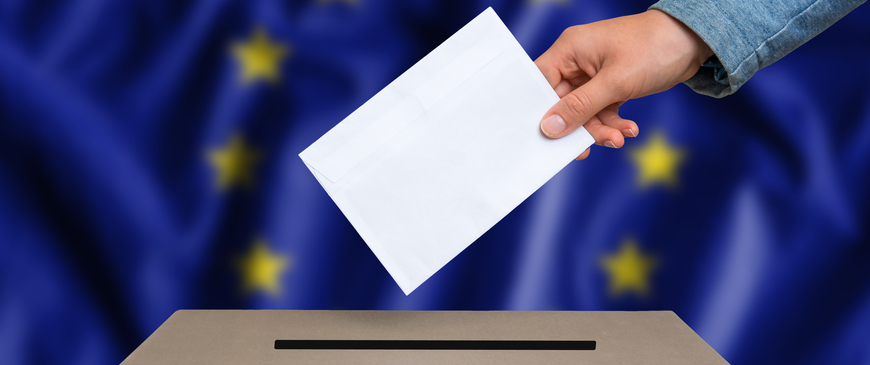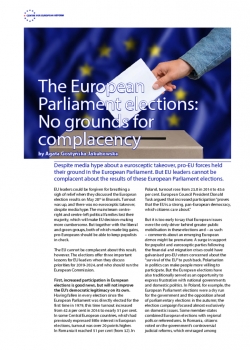
The European Parliament elections: No grounds for complacency
Despite media hype about a eurosceptic takeover, pro-EU forces held their ground in the European Parliament. But EU leaders cannot be complacent about the results of these European Parliament elections.
EU leaders could be forgiven for breathing a sigh of relief when they discussed the European election results on May 28th in Brussels. Turnout was up, and there was no eurosceptic takeover, despite media hype. The mainstream centre-right and centre-left political families lost their majority, which will make EU decision-making more cumbersome. But together with the liberal and green groups, both of which made big gains, pro-Europeans should be able to keep populists in check.
The EU cannot be complacent about this result, however. The elections offer three important lessons for EU leaders when they discuss priorities for 2019-2024, and who should run the European Commission.
First, increased participation in European elections is good news, but will not improve the EU’s democratic legitimacy on its own.
Having fallen in every election since the European Parliament was directly elected for the first time in 1979, this time turnout increased from 42.6 per cent in 2014 to nearly 51 per cent. In some Central European countries, which had previously expressed little interest in European elections, turnout was over 20 points higher. In Romania it reached 51 per cent (from 32). In Poland, turnout rose from 23.8 in 2014 to 45.6 per cent. European Council President Donald Tusk argued that increased participation “proves that the EU is a strong, pan-European democracy, which citizens care about.”
But it is too early to say that European issues were the only driver behind greater public mobilisation in these elections and – as such – comments about an emerging European demos might be premature. A surge in support for populist and eurosceptic parties following the financial and migration crises could have galvanised pro-EU voters concerned about the “survival of the EU” to push back. Polarisation in politics can make people more willing to participate. But the European elections have also traditionally served as an opportunity to express frustration with national governments and domestic politics. In Poland, for example, the European Parliament elections were a dry run for the government and the opposition ahead of parliamentary elections in the autumn; the election campaign focused almost exclusively on domestic issues. Some member-states combined European elections with regional polls or referendums. In Romania, citizens voted on the government’s controversial judicial reforms, which envisaged among other things an amnesty for those convicted of corruption. Ultimately, only detailed surveys on the motivations of voters will confirm whether increased turnout equals greater public engagement with European issues.
There is also little evidence that the Spitzenkandidaten system, whereby European political parties put forward their candidates for the office of Commission president, boosted turnout. Supporters of the idea argued that more people would vote if they knew they could influence the choice of the president. The decision to make the charismatic Frans Timmermans, first vice-president of the Commission, the lead candidate of the Party of European Socialists (PES) may have contributed to the electoral success of his party, the Dutch Labour party. But according to a poll conducted by YouGov for the German Press Agency in April, only 26 per cent of Germans knew who the European People’s Party (EPP) Spitzenkandidat was, despite the fact that it was Manfred Weber, a German.
The EU’s legitimacy ultimately depends not on turnout or the popularity of the Spitzenkandidaten, but on whether after the elections voters see changes in the policy areas they care about, including migration, the economy, unemployment and climate change. EU leaders, who will nominate their preferred candidate for the post of Commission president (subject to election by the European Parliament), should ensure that their nominee is willing to address these concerns.
Second, being clear pays off.
The elections showed that being vague does not always pay off. The lack of clear, passionate positions on the issues that matter to EU citizens seems to have cost the centre-right EPP and PES votes. Instead, European voters were increasingly drawn towards political movements advocating more radical solutions (good or bad) to the EU’s problems. This benefitted not only populist and eurosceptic parties but also the pro-European camp. Liberals (who joined forces with Macron’s political formation, Renaissance) and greens capitalised on the public’s weariness with the mainstream political families whose ambition is to ‘muddle through’. In Britain, the Liberal Democrats and the Green Party went from one seat in 2014 to 16 this time and from three seats to seven respectively, thanks to their clear support for another referendum and their opposition to Brexit. The Labour party, on the fence on Brexit, lost half of its seats.
The success of green parties across the EU makes them valuable coalition partners for the EPP and PES, who will only be able to pass legislation if they have the liberals and/or the greens on board. The greens have already indicated that they will only back a candidate for Commission president who is serious about climate action, fighting social injustice and defending the rule of law. The European Council should embrace these priorities in the EU’s Strategic Agenda for 2019-2024, and pick a Commission president who is a good communicator and will push to implement this agenda.
Third, the populist threat is alive and kicking, but this does not have to be a bad thing.
The next European Commission president should not be afraid of confronting eurosceptics and their narrative in the European Parliament. Although populists failed to storm the institution, they topped the polls in four of the six largest member-states: the UK, France, Italy and Poland. As such, they cannot be disregarded. After watching the Brexit mess unfold, most populists now say that they want to build a Europe of nations, moving power away from supranational institutions towards member-states, rather than scrap the EU altogether. Whatever their real intentions, their revised narrative might appeal in several countries, especially Poland, where the public is very pro-European but also divided on how far the EU should intervene in what Poles see as domestic affairs. European populists will continue to use the European Parliament as a platform for eurosceptic rhetoric, and a means of acquiring funding and amplifying their support domestically.
Strong populist representation in the European Parliament does not have to be a bad thing for European democracy, if it forces pro-European groups to engage in robust discussion on why their policy proposals are better than those of the eurosceptics. Greater political competition, not only between pro- and anti-European forces, but also within the pro-European bloc, could boost public interest in European politics.
Pro-European groups in the European Parliament will be tempted to avoid these clashes, because the parliamentary arithmetic is in their favour anyway. They might see no need to go outside of their comfort zone to debate eurosceptics. But such an approach risks giving the public the impression that although it asked for change it will only get more of the same. Such complacency would squander the democratic potential of these elections.
Agata Gostyńska-Jakubowska is a senior research fellow at the Centre for European Reform.

